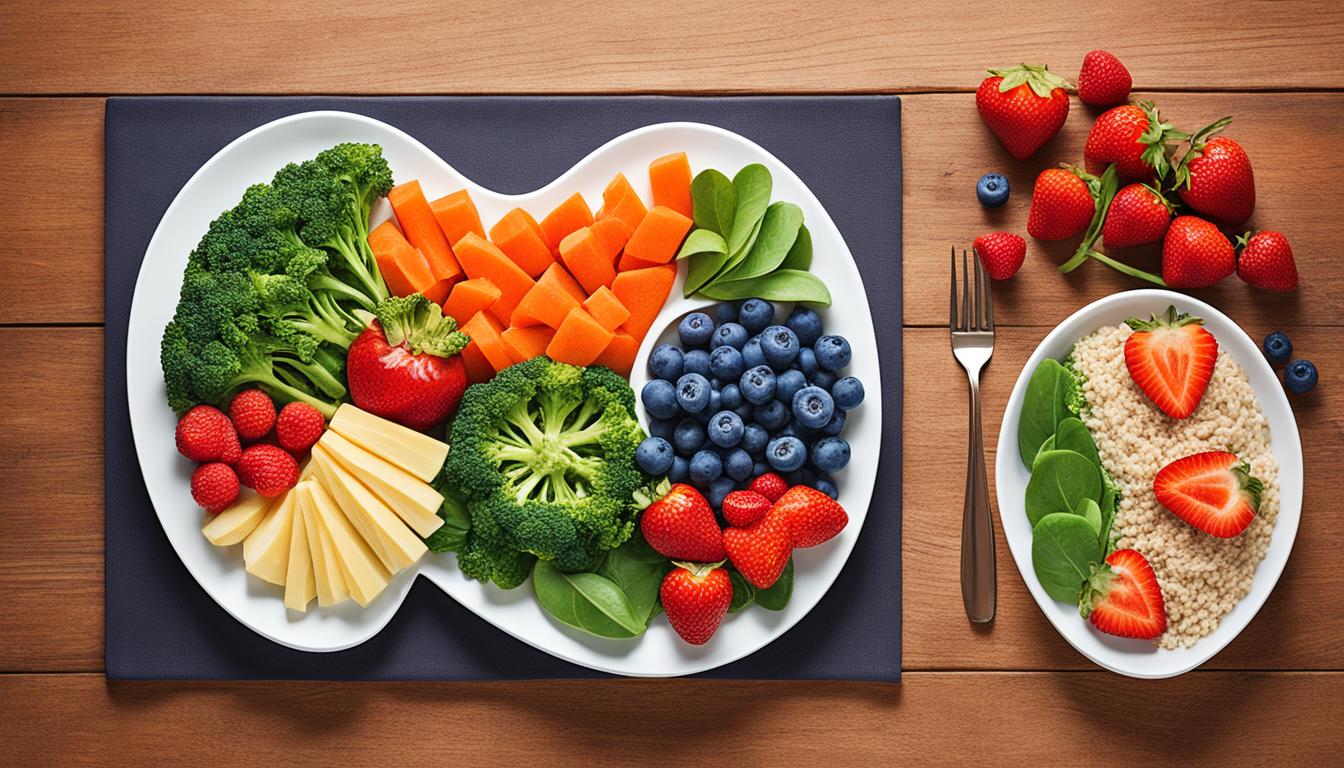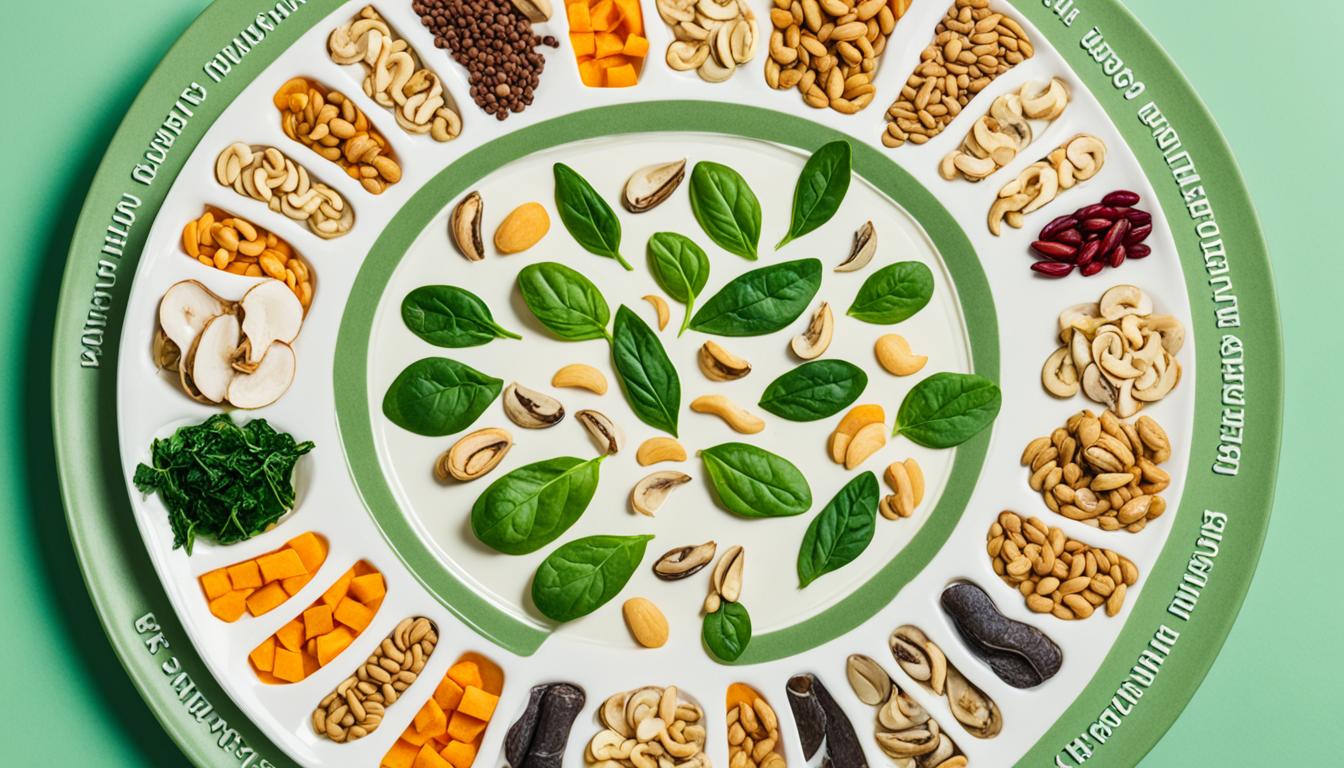Calories Intake Guide for Balanced Nutrition

Do you know how many calories you should be eating every day for optimal health? Is there a magic number that guarantees a balanced diet? Let’s challenge the common belief that calorie intake is a one-size-fits-all concept. Discover the truth about calories and how they contribute to a well-rounded nutritional plan.
Key Takeaways:
- Understanding your daily calorie intake is crucial for maintaining a balanced diet.
- The recommended calorie intake varies based on factors such as weight, age, health, and activity level.
- To lose weight, create a calorie deficit by consuming fewer calories than your body burns.
- Focus on including nutrient-rich foods in your diet to achieve optimal health.
- Tracking your calorie intake with the help of apps can assist in monitoring your nutrition.
How Many Calories Should I Eat in a Day?
When it comes to calorie intake, finding the right balance is key to maintaining a healthy lifestyle. The average man should aim for around 2,500 calories per day, while the average woman should aim for approximately 2,000 calories per day. However, it’s important to note that individual calorie requirements can vary based on factors such as weight, age, health, and activity level.
Listening to your body and monitoring your weight can help you determine if you are consuming the right amount of calories. If you find that you are consistently gaining weight, it may be an indication that you are consuming more calories than your body needs. On the other hand, if you are consistently losing weight or feeling fatigued, you may not be getting enough calories to support your energy needs.
Calculating your daily calorie intake can provide a helpful starting point. There are numerous online calculators available that can help you estimate your calorie needs based on your gender, age, weight, height, and activity level. Keep in mind that these calculations are just estimates and may not be 100% accurate for everyone.
It’s important to approach calorie intake with flexibility and consider your overall health and well-being. Rather than obsessing over specific numbers, focus on eating a variety of nutrient-dense foods that provide the energy and nutrients your body needs to function optimally.
“Calories aren’t the enemy; they’re a vital source of energy for our bodies. It’s all about finding the right balance and nourishing your body with wholesome foods.”
Eating a balanced diet that includes a variety of fruits, vegetables, whole grains, lean proteins, and healthy fats can help you maintain a healthy calorie intake and provide your body with the nutrients it needs. Remember to listen to your body, make mindful food choices, and seek guidance from a healthcare professional or registered dietitian if you have specific health or weight management goals.
| Gender | Age | Sedentary | Lightly Active | Moderately Active | Very Active |
|---|---|---|---|---|---|
| Male | 18-30 | 2,400-2,600 | 2,600-2,800 | 2,800-3,000 | 3,000-3,200 |
| 31-50 | 2,200-2,400 | 2,400-2,600 | 2,600-2,800 | 2,800-3,000 | |
| Female | 18-30 | 1,800-2,000 | 2,000-2,200 | 2,200-2,400 | 2,400-2,600 |
| 31-50 | 1,600-1,800 | 1,800-2,000 | 2,000-2,200 | 2,200-2,400 |
How many calories should I eat to lose weight?
When it comes to weight loss, creating a calorie deficit is key. This means consuming fewer calories than your body burns on a daily basis. By doing so, you can gradually lose weight over time. But how many calories should you eat to achieve this? Let’s find out.
On average, reducing your daily calorie intake by 500–600 calories can lead to a steady weight loss of 1-2 pounds per week. This is considered a healthy and sustainable rate of weight loss. However, it’s important to note that individual results may vary based on factors such as age, gender, metabolism, and activity level.
To get a more accurate estimate of your recommended daily calorie intake for weight loss, you can use a daily calorie intake calculator. These calculators take into account your age, weight, height, activity level, and weight loss goals to provide you with a personalized calorie recommendation.
While reducing your calorie intake is important for weight loss, it’s equally important to focus on the quality of the food you’re consuming. Opt for nutrient-dense foods that are rich in vitamins, minerals, and fiber. These include fruits, vegetables, whole grains, lean proteins, and healthy fats.
“Weight loss is not just about calories in versus calories out. The quality of the food you eat plays a major role in your overall health and weight loss journey.”
In addition to controlling your calorie intake, incorporating regular exercise into your routine can enhance weight loss and help you maintain muscle mass. Physical activity not only burns calories but also boosts your metabolism and improves your overall fitness.
Remember, everyone’s weight loss journey is unique, and it’s important to consult with a healthcare professional or registered dietitian before making significant changes to your calorie intake or embarking on a new weight loss plan.
Next, let’s explore the types of foods that you should consider subtracting from your diet to support your weight loss goals.
Foods to Subtract: Daily Reference Intakes
Daily reference intakes provide guidelines for the maximum amounts of certain nutrients in our diet, such as fat, saturated fat, sugars, and salt. It is essential to be mindful of these reference intakes and make informed choices about the foods we consume to maintain a balanced diet.
Excessive consumption of these nutrients can lead to various health issues, including obesity, cardiovascular diseases, and high blood pressure. By minimizing our intake of foods high in these nutrients, we can promote better health and well-being.
Foods to Eat Less Of
It is important to be aware of the foods that contribute significantly to our calorie and nutrient intake. By reducing our consumption of these foods, we can make progress towards a healthier diet and manage our calorie intake effectively.
- Sugary Drinks: Beverages such as sodas, energy drinks, and sweetened juices are often high in added sugars. These drinks can contribute to excess calorie intake without providing essential nutrients. Opt for healthier alternatives like water, herbal tea, or infused water with fresh fruits for flavor.
- Processed Snacks: Chips, crackers, cookies, and other processed snacks are often high in unhealthy fats, refined carbohydrates, and added sugars. These snacks may satisfy immediate cravings but provide little nutritional value. Choose whole, natural snacks like fruits, vegetables, and nuts for a healthier option.
- Fast Food: Fast food meals are typically high in calories, unhealthy fats, sodium, and sugars. Regular consumption of fast food can contribute to weight gain and negative health effects. Opt for homemade meals or healthier restaurant choices with a focus on fresh ingredients and balanced nutrition.
- Fried Foods: Foods that are deep-fried or fried in unhealthy oils can be high in unhealthy fats and calories. Limit your intake of fried foods like French fries, fried chicken, and fried snacks. Choose healthier cooking methods like baking, grilling, or steaming for your favorite dishes.
- Processed Meats: Processed meats like sausages, bacon, hot dogs, and deli meats are often high in sodium and unhealthy fats. These meats have been linked to an increased risk of various health conditions, including heart disease and cancer. Opt for lean protein sources like fish, poultry, or legumes instead.
By reducing our consumption of these foods, we can decrease our calorie intake and improve our overall nutrition. Making simple swaps and incorporating more whole, nutritious foods into our diet can help us achieve a healthier balance.
| Nutrient | Daily Reference Intake Limit | Foods to Limit |
|---|---|---|
| Fat | Less than 70g | Fried foods, pastries, and fatty meats |
| Saturated Fat | Less than 20g | Butter, full-fat dairy products, and fatty cuts of meat |
| Sugars | Less than 90g | Sugary drinks, processed snacks, and desserts |
| Salt | Less than 6g | Processed meats, fried foods, and canned soups |
Being mindful of these daily reference intake limits and making smart choices when it comes to our food consumption can go a long way toward maintaining a balanced diet and promoting overall health and well-being.
Foods to Eat More Of
When it comes to maintaining a balanced diet, one of the key factors is choosing the right foods to include in your meals. By focusing on calorie intake and incorporating nutrient-rich options, you can support your overall health and well-being. Here are some top choices to consider:
Fruits and Vegetables
One of the foundations of a balanced diet is consuming an adequate amount of fruits and vegetables. These nutrient powerhouses are low in calories and high in essential vitamins, minerals, and fiber. Aim to include at least five portions of fruits and vegetables in your daily meals.
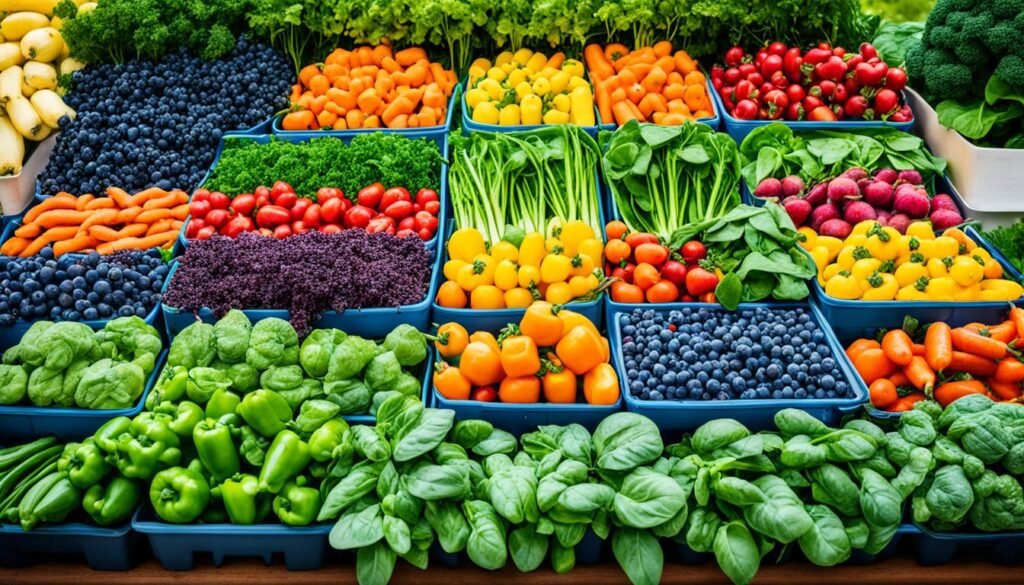
Fiber-Rich Foods
In addition to fruits and vegetables, incorporating fiber-rich foods is important for maintaining a healthy digestive system and promoting satiety. Foods such as beans, lentils, nuts, and whole grains are excellent sources of fiber. Including these foods in your diet can help regulate blood sugar levels and support weight management.
Benefits of a Balanced Diet
“A balanced diet rich in fruits, vegetables, and fiber is essential for overall health and well-being. These foods provide essential nutrients, vitamins, and minerals that support various bodily functions.”
By prioritizing a balanced diet that includes these foods, you can improve your nutritional intake, manage your weight, and reduce the risk of chronic diseases. It’s essential to make them a regular part of your meals for optimal health.
Achieving a Balanced Diet
Rather than solely focusing on calorie intake, it is important to take a holistic approach to nutrition and ensure a balanced diet that provides the body with essential macronutrients and micronutrients.
A balanced diet consists of a combination of macronutrients such as fats, proteins, and carbohydrates, as well as a variety of vitamins and minerals. Each of these elements plays a crucial role in supporting overall health and well-being.
Fat is an essential nutrient that provides energy, aids in the absorption of vitamins, and supports healthy cell function. Sources of healthy fats include avocados, nuts, and olive oil.
Protein is important for the growth, repair, and maintenance of body tissues. It also plays a role in hormone regulation and enzyme production. Good sources of protein include lean meats, poultry, fish, and plant-based options such as beans, lentils, and tofu.
Carbohydrates are the body’s primary source of energy, providing fuel for physical activity and brain function. Choose complex carbohydrates like whole grains, fruits, and vegetables, as they provide more fiber and nutrients compared to refined grains and sugary foods.
Vitamins and minerals are crucial for various bodily functions, including immune system support, energy production, and bone health. Ensure a diverse intake of fruits, vegetables, and whole foods to obtain a wide range of these essential nutrients.
To visually illustrate the importance of a balanced diet, here is a table showcasing the recommended daily intake of macronutrients and some key vitamins and minerals:
| Nutrient | Recommended Daily Intake | Sources |
|---|---|---|
| Fat | 20–35% of total calories | Olive oil, avocados, and nuts |
| Protein | 10–35% of total calories | Lean meats, poultry, fish, beans, and lentils |
| Carbohydrates | 45–65% of total calories | Whole grains, fruits, and vegetables |
| Vitamin C | 75-90mg | Citrus fruits, strawberries, and bell peppers |
| Vitamin D | 600-800 IU | Fatty fish, fortified dairy products |
| Calcium | 1,000-1,200mg | Dairy products, leafy greens, and fortified foods |
| Iron | 8-18mg | Red meat, beans, and spinach |
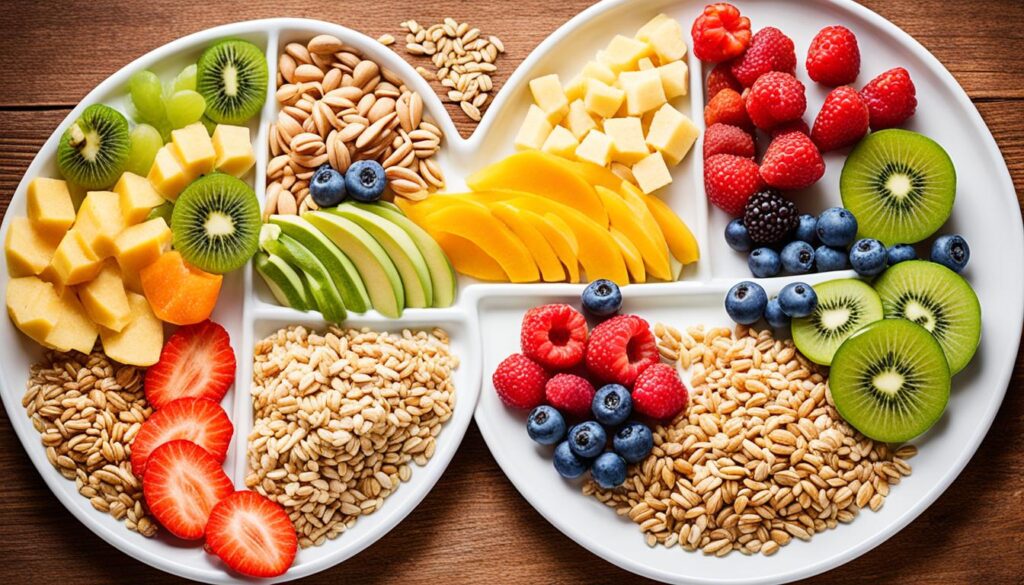
By following a balanced diet that incorporates a variety of nutrient-rich foods, you can ensure that your body receives the right combination of macronutrients and micronutrients for optimal functioning and overall health.
Importance of Calorie Intake for Weight Loss and Muscle Gain
Determining the right calorie intake is crucial for achieving your weight loss and muscle gain goals. Your calorie intake plays a significant role in managing your body composition and overall fitness.
When it comes to weight loss, consuming fewer calories than your body burns is essential. This creates a calorie deficit, prompting your body to utilize stored fat for energy, resulting in weight loss. It is important to note that drastic calorie restriction can be detrimental to your health, so it’s recommended to aim for a gradual and sustainable weight loss of 1-2 pounds per week. By understanding and monitoring your calorie intake, you can make informed choices about the foods you consume and maintain a healthy calorie deficit.
On the other hand, if your goal is to build muscle, you need to consume more calories than your body burns. Extra calories provide the energy needed for muscle growth and repair. However, it’s important to focus on consuming nutrient-dense foods to support muscle development rather than relying on unhealthy, calorie-dense options. Combining your increased calorie intake with a structured strength training program can help you maximize muscle gain.
Finding the right balance between calorie intake, weight loss, and muscle gain can be challenging. It’s essential to consult with a healthcare professional or a registered dietitian who can provide personalized guidance tailored to your specific goals and dietary needs. They can help you calculate your daily calorie needs, design a customized meal plan, and monitor your progress along the way.
“Understanding your calorie intake is fundamental when it comes to weight management. Whether your goal is losing weight or gaining muscle, a balanced and appropriate calorie intake is critical to get the desired results.”
Tips for Effective Calorie Management:
- Track your calorie intake using a food diary or a calorie tracking app.
- Eat a variety of nutrient-dense foods, including lean protein, whole grains, fruits, and vegetables.
- Avoid highly processed foods that are high in added sugars, unhealthy fats, and empty calories.
- Stay hydrated by drinking plenty of water throughout the day.
- Engage in regular physical activity to optimize calorie burn and support overall health.
- Monitor your progress and make adjustments to your calorie intake as needed.
Calorie Intake for Weight Loss and Muscle Gain
| Goal | Calorie Intake |
|---|---|
| Weight Loss | Consume fewer calories than your body burns |
| Muscle Gain | Consume more calories than your body burns |
By understanding the importance of calorie intake for weight loss and muscle gain, you can make informed decisions about your nutrition and fitness journey. Remember, achieving your goals is a holistic process that requires consistency, dedication, and professional guidance.
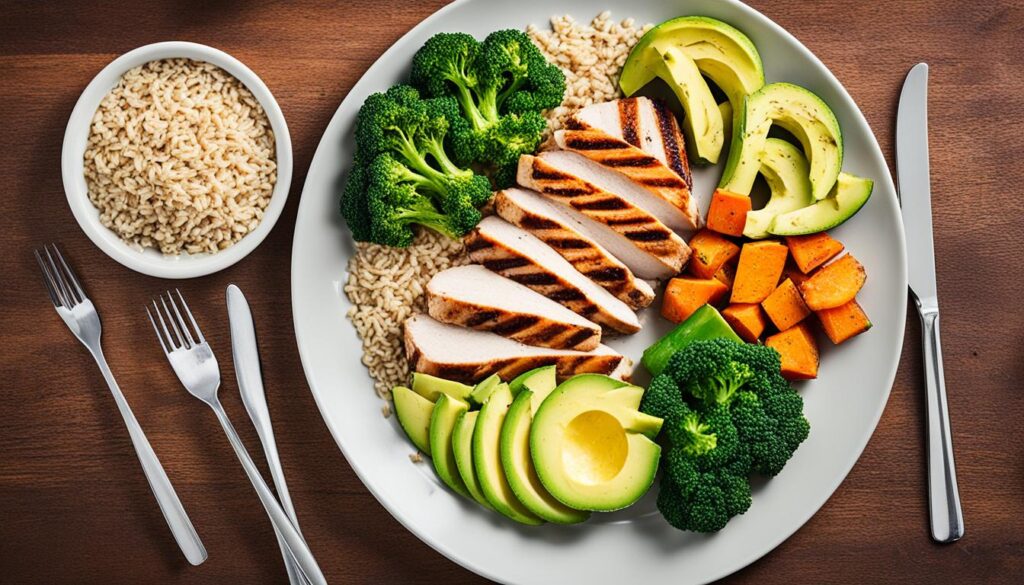
Best Calorie Tracking Apps
If you’re looking to monitor your calorie intake and maintain a healthy diet, there are several excellent calorie-tracking apps available. These apps not only help you keep track of your food consumption but also offer features that can support your overall nutrition goals. Here are some of the best calorie-tracking apps:
-
MyFitnessPal
MyFitnessPal is a popular choice among fitness enthusiasts and those looking to manage their calorie intake. This comprehensive app allows you to easily log your meals, track your macros, set personalized goals, and access a vast database of food items. MyFitnessPal also offers a barcode scanner for convenient tracking and provides insights into your nutrient intake.
-
Lose It!
Lose It! is another top-rated calorie tracking app that offers a user-friendly interface and a range of helpful features. With Lose It!, you can log your meals, track your calorie intake, and set weight loss goals. The app also provides a community aspect, allowing you to connect with others and receive support on your fitness journey.
-
Fitbit
Fitbit is well-known for its wearable fitness devices, but it also offers a powerful app that includes a calorie tracking feature. In addition to monitoring your steps and activity level, Fitbit allows you to log your meals, track your calorie intake, and set personalized goals. The app syncs seamlessly with Fitbit devices, providing a holistic view of your health and fitness.
By using these calorie-tracking apps, you can easily stay on top of your calorie intake and make informed decisions about your diet. Whether you want to lose weight, maintain a balanced diet, or simply gain a better understanding of your eating habits, these apps can be valuable tools on your journey to optimal health.
Understanding your optimal calorie intake is key to maintaining a balanced diet and achieving your weight goals. By tracking your calorie intake and making mindful food choices, you can ensure that you are providing your body with the right amount of energy and nutrients. Calorie tracking apps like MyFitnessPal, Lose It!, and Fitbit can be valuable tools in helping you monitor your calorie intake and stay on track.
Remember, a balanced diet is not just about calories. It’s important to focus on the quality of the food you eat as well. Including a variety of fruits, vegetables, whole grains, lean proteins, and healthy fats in your diet can provide the essential nutrients your body needs. Additionally, paying attention to portion sizes and listening to your body’s hunger and fullness cues can help you maintain a healthy calorie intake.
While monitoring your calorie intake and making healthy food choices is important, it’s always recommended to consult with a healthcare professional for personalized advice and guidance. They can provide you with the best recommendations based on your individual needs and goals. Remember, maintaining balanced nutrition and a healthy lifestyle is a lifelong journey, and small changes can make a big difference in achieving optimal health.
FAQ
How many calories should I eat in a day?
How many calories should I eat to lose weight?
What are the daily reference intakes?
What are some foods I should eat less of?
What are some foods I should eat more of?
How can I achieve a balanced diet?
How important is calorie intake for weight loss and muscle gain?
What are some of the best calorie-tracking apps?
What is the significance of calorie tracking?






